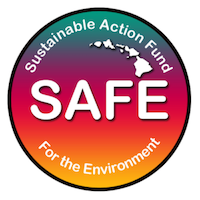California water attorney Tim O’Laughlin aka “The Hammer,” hired by Mahi Pono last year as Chief Operating Officer, has left that position, Politics on Maui has learned. “He is no longer on the island,” a Mahi Pono employee said Friday when I called the office and asked for him. His departure was later confirmed by others. Company vice-president of operations Shan Tsutsui is expected to move into O’Laughlin’s job, although that information could not be confirmed directly with the company. Tsutsui declined to comment but said that Mahi Pono would be making an announcement in a few days.
This week, O’Laughlin’s belongings were loaded into a container for the trip back to California, where his new job is rumored to be legal counsel to Trinitas Partners in Northern California. If true, that’s not surprising. O’Laughlin has long been associated with the company’s various Central California water issues. Interestingly, his departure comes within days of the announcement that Wall Street will begin trading water futures as a commodity, tied to water prices in California.
Those of you familiar with the Mahi Pono saga will remember that it was Trinitas, a private equity firm specializing in agricultural real estate, that partnered with Canada’s Public Sector Pension Investment Board in 2017 to form the California-based Pomona Farming. That, in turned spawned Mahi Pono (Hawaiian for “to grow or cultivate morally or properly”) which purchased 41,000 acres of former sugarcane land from Alexander & Baldwin two years ago this month. The company also owns half of the 15,000-acre East Maui Irrigation water system with A&B. The $267-million purchase contained a caveat: if Mahi Pono fails to obtain a permanent state-issued water lease, A&B will have to kick back up to $62 million, or about 20 percent of the purchase price.
O’Laughlin, who got his “Hammer” nickname for the hardball tactics he used in California to privatize publicly-owned water, was hired in October, 2019. Last year saw the Hawaii Legislature reject a bill that would have prolonged the state’s use of temporary revocable water permits, which is how East Maui water has been diverted into Central Maui ag fields for decades. Instead, Mahi Pono now had to provide an Environmental Impact Statement (EIS) in order to obtain a state-issued 30-year water lease.
In pursuit of that goal, Mahi Pono dropped a 2,700-page draft EIS on the Maui community in fall 2019. It was immediately derided by everyone from progressive groups to county water officials for numerous deficiencies. Mahi Pono (with help from A&B) was then to revise the document, taking into consideration the comments received, and reissue it. Nothing has been heard about that EIS since, aside from a vague promise that a new version would be “coming soon,” made by Mahi Pono’s Grant Nakama at a recent hearing before the board of the Department of Land and Natural Resources (DLNR). At that meeting, Mahi Pono was granted yet another revocable permit, despite the legislature’s action and the fact that a decision in a lawsuit on that very matter is expected any day.
An Iffy Track Record
So did O’Laughlin resign, or was he shown the door? Hard to say. Mahi Pono wrangled another revocable permit out of the state, so he could tote that in the “win” column. However, the rest of his track record during his tenure has been pretty miserable. His promise that Mahi Pono would plant 6,000 acres of new crops this year–made to the Maui News last January–fell way short of the mark. During the DLNR hearing, Nakama told the board that only 2,600 acres had been planted in 2020, and that the company expects its planted acreage to reach 5,700 acres by the end of 2021.
Although O’Laughlin emphasized in the same Maui News article that “transparency” and “being a good neighbor” were main goals, Mahi Pono continued to churn up dust as it tilled, and fought even more fires on its land last summer. It also has remained stubbornly non-transparent about its use of Gramoxone, a restricted-use herbicide containing paraquat, a highly toxic chemical which is banned internationally. Restricted-use pesticides are not available for public use, often due to their toxicity, and can only be applied by licensed personnel.
The company maintains on its website that it is committed to “responsible” farming, “sustainable agriculture,” and “stewardship of Maui’s natural resources,” including water. Still, a review of Mahi Pono’s 2020 pesticide purchase records from the Hawaii Dept. of Agriculture shows the company continuing to purchase Gramoxone and other restricted-use pesticides to spray on its crops, which are not considered to be mainstays of any kind of “sustainable” agriculture operation.
Tsutsui in charge finally brings truth to his assertion two years ago that the company would “have a local team at work” and be “locally operated” (although decisions are still being made from the mainland). He has acknowledged in other interviews that he has little farming experience and, perplexingly, he still maintains a second job as Managing Partner at the Oahu-based public affairs and lobbying firm, Strategies 360. How does that even work? Tsutsui has never answered that question.
Expect further management changes at Mahi Pono as the leadership queue reshuffles.
https://politicsonmaui.com/the-hammer-heads-home-tim-olaughlin-departs-mahi-pono

Leave a Reply